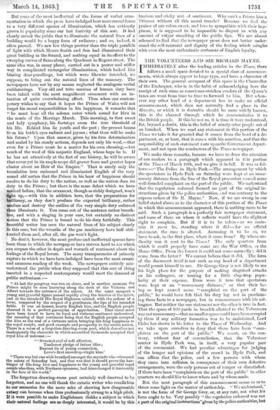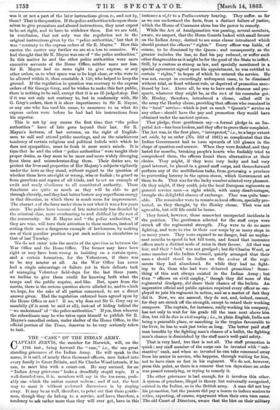TIIE VOLUNTEERS AND SIR RICHARD 3f AYNE.
IMMEDIATELY after the leading articles in the Times, there follows a small space devoted to a special class of announce- ments, which always appear in Large typo, and have a character of their own. The general occupant of this space is the Chancellor of the Exchequer, who is in the habit of acknowledging here the receipt of such sums as conscience-stricken evaders of the Queen's taxes are wont from time to time to forward to him. But when- ever any other head of a department has to make an official announcement, which does not naturally find a place in the Gazette, or which it is desirable should be more widely known, this is the channel through which he communicates it to the British people. If this be not so, it is time it were understood, for, beyond a doubt, this is the belief of ninety-nine people out of an hundred. When we read any statement in this portion of the Times we take it for granted that it comes from the head of a de- partment, or, at least, that it comes with his sanction, and that the responsibility of such statement rests upon the Government depart- ment, and not upon the conductors of the Times newspaper.
We make these remarks, because we have th draw the attention of our readers to a paragraph which appeared in this portion of the Times of March 10th, and we give it in full. It was as fol- lows:—" The Police in Hyde Park.—The arrangement by which the spectators in Hyde Park on Saturday were kept at an mine- cessary distance from the line of the Royal procession caused some well-founded complaint on the part of the public. We understand that the regulation enforced formed no part of the original in- structions given by the police authorities, end was contrary to the express orders of Sir R. Mayne." Now, if we are wrong in our belief stated above as to the character of this portion of the 7'imes in which this announcement appeared, there is nothing more to be said. Such a paragraph is a perfectly fair newspaper statement, and none of those on whom it reflects would have the slightest right to complain. But if it is to be taken—as we main- tain it most be, standing where it did— for an official statement, the case is altered. Assuming it to be so, we have to ask, in the first place, where it came from ? By whose au- thority was it sent to the Times? The only quarters from which it could properly have come are the War Office, or the Home Office. From the former it could not come assuredly ; did it come from the latter? We cannot believe that it did. The form of the document itself is not such as any head of a department would permit himself to use. Sir George Grey is not likely to use his high place for the purpose of making disguised attacks on his colleagues, or touting for a little clap-trap popu- larity at their expense. Even were it true that spectators were kept at an "unnecessary distance," or that their be- ing so kept caused some "complaint on the part of the public," he would have felt that his duty lay, not in proclaim- ing these facts in a newspaper, but in remonstrance with his col- leagues. But neither the one statement nor the other is true in fact. That the space of 100 yards in breadth allotted to the Volunteers was not unnecessary—that no smaller space could have been occupied by them if any military formation was to be maintained, Lord Etch° has shown in his letter to the Times of Wednesday. And we take upon ourselves to deny that there have been " com- plaints on the part of the public." We assert, on the con- trary, without fear of contradiction, that the Volunteer muster in Hyde Park was, in itself, a very popular part of the ceremonial. We had peculiar advantages for judging of the temper and opinions of the crowd in Hyde Park, and can affirm that the police, and a few persons with whom they came into collision in consequence of their own defective arrangements, were the only persons out of temper or dissatisfied. If there have been "complaints on the part of the public" in other quarters we should like to know where and by whom made.
But the next paragraph of this announcement seems to us to throw some light on the matter of authorship. "We understand,' is not the form of Sir George Grey, or, at any rate, not what his form ought to be. Very possibly "the regulation enforced was not a part of the original instructions" given by the police authorities, but
was it or not a part of the later instructions given to, and not by, them? That is the question. If the police authorities take upon them- selves to give premature and absurd instructions, they must expect to be set right, and to have to withdraw them. But we are told, in conclusion, that not only was the regulation not in the original instructions given by the "police authorities," but that it was "contrary to the express orders of Sir R. Mayne." How this carries the matter any further we are at a has to conceive. We had thought that Sir R. Mayne was one of "the police authorities." In this matter he and the other police authorities were mere executive servants of the Home Office, neither more nor less. Sir R. Mayne had no more right to give express, or any other orders, as to what space was to be kept clear, or who were to be allowed within it, than constable A 150, who helped to keep the ground. If the regulation in question was contrary to the express orders of Sir George Grey, and he wishes to make this fact public, there is nothing to be said, except that it is an ill-judged step. But if it was not only not contrary to, but in conformity with, Sir G. Grey's orders, then it is sheer impertinence in Sir R. Mayne, or any one who has used his name, to announce to us what his express orders were before he had had his instructions from his superior.
This is not by any means the first time that "the police authorities" have of late gone beyond their last. Sir R. Mayne's lectures, of last autumn, on the right of English- men to call and attend public meetings, and on the mischievous tendency of certain religious and political beliefs with which he does not sympathize, must be fresh in most men's minds. It is time that he and the other "police authorities" were taught their proper duties, as they seem to be more and more widely diverging from them and misunderstanding them. Their duties are, to protect the lives and properties of Her Majesty's subjects vigilantly under the laws as they stand, without regard to the question of whether those laws are right or wrong, wise or foolish ; to guard us from garotters and rogues of all kinds, and to set an example of i'wift and ready obedience to all constituted authority. These functions are quite as much as they will be able to get through cleverly, and they had better bestow any superfluous energy in that direction, in which there is much room for improvement. The charact. r of the force under them is not what it was a few years since. The police have become of late notoriously less dreaded by the criminal class, more overbearing to and disliked by the rest of the community. Sir R. Mayne and "the police authorities," if they are wise, will turn their attention to these matters, instead of setting their men a dangerous example of lawlessness, by making use of their peculiar position to put such notices in circulation as that of last Tuesday.
We do not enter into the merits of the question as between the War Office and the Home Office. The former may have been right or may have been wrong in insisting on a certain space, and a certain formation, for the Volunteers, if there was to be any muster at all. As the War Office has never had a single miscarriage or failure yet in their delicate task of managing Volunteer field-days for the last three years, we incline to give them credit for knowing both what the troops and the public require, and like. But, apart from the merits, there is the serious question above alluded to, and to which we hope, for the sake of all parties concerned, to see a direct answer given. Had the regulation enforced been agreed upon by the Home Office or not ? If no, why does not Sir G. Grey say so manfully (if it must be said at all), instead of hiding behind the "we understand" of "the police authorities." If yes, then whoever the subordinate may be who takes upon himself to publish Sir R. Mayne's cancelled orders, under shelter of the Home Office, in the official portion of the Times, deserves to be very seriously taken to task.































 Previous page
Previous page